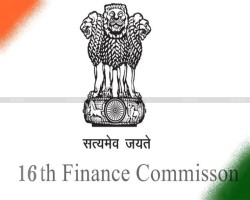UPSC Current Affairs
| Polity and Governance |
|---|
|
|
|
Why in the news?
The 16th Finance Commission arrived in Kerala on a three-day visit as part of preparing its recommendations. The Finance Commission is a constitutional body that recommends how tax revenues collected by the Central government should be distributed among the Centre and various States in the country. The Commission’s recommendations are aimed at fostering fiscal federalism and ensuring that state governments have the necessary funds to implement development projects. About Finance Commission: The Finance Commission, established under Article 280 of the Constitution of India, is to be constituted every fifth year or earlier, as per clause (1) of that article. It is a constitutional and quasi-judicial body. Accordingly, the first Finance Commission was constituted in 1951. The President of India appoints a finance commission every five years or at an earlier time that he considers necessary. Its primary role is to review the financial position of the states and recommend measures to enhance the fiscal capacity of both the central and state governments. The Commission plays a crucial role in ensuring the equitable distribution of financial resources between the centre and the states, thereby promoting balanced economic growth across the country. Finance Commission Composition: The Finance Commission consists of a Chairman and four other members appointed by the President of India. They serve for a term specified by the President and are eligible for reappointment. The Constitution empowers Parliament to set the qualifications for the Commission's members and outline the selection process. Following this constitutional provision, Parliament has defined the qualifications required for both the Chairman and the members. The Chairman must possess experience in public affairs, while the four other members are to be chosen from the following categories: A judge of a High Court or an individual qualified for such an appointment. A person with specialized knowledge in finance and government accounting. An individual with extensive experience in financial matters and administration. A person who has specialized knowledge in economics. Finance Commission Functions: The Finance Commission is tasked with making recommendations to the President of India on several crucial financial matters. The President then presents such reports to both Houses of Parliament, accompanied by an explanatory memorandum detailing the actions taken on its recommendations. However, the Centre is not legally bound to implement the suggestions made by the Finance Commission. The key areas for which the Finance Commission provides recommendations include: Vertical Devolution: The share of states in the divisible pool of central taxes. Horizontal Distribution: The allocation of resources among states based on a formula that reflects their fiscal needs, capacities and performance. Grants-in-aid: The additional transfers to specific states or sectors that are in need of assistance or reform. Among the grants made by the 13th FC, two important ones were justice delivery and the statistical system. The Department of Justice identified several initiatives that needed support, including increasing the number of courts working hours, enhancing support to Lok Adalat, providing additional funding to State Legal Services Authorities, promoting the Alternate Dispute Resolution mechanism, enhancing the capacity of judicial officers and public prosecutors through training programmes, and supporting the creation of a judicial academy in every state to facilitate such training. 16th Finance Commission: The Sixteenth Finance Commission was constituted on 31.12.2023 with Shri Arvind Panagariya, former Vice-Chairman, NITI Aayog as its Chairman. Now the following members are appointed to the Commission with the approval of the President of India. Members: Ajay Narayan Jha, Member Annie George Mathew, Member Manoj panda, Member Soumya Kanti Ghosh, Part-Time Member Ritvik Ranjanam Pandey, Secretary The Sixteenth Finance Commission has been requested to make its recommendations available by October, 31, 2025, covering an award period of 5 years commencing 1st April, 2026. 15th Finance Commission: The Finance Commission (FC) is a constitutional body, that determines the method and formula for distributing the tax proceeds between the Centre and states, and among the states as per the constitutional arrangement and present requirements. Under Article 280 of the Constitution, the President of India is required to constitute a Finance Commission at an interval of five years or earlier. The 15th Finance Commission was constituted by the President of India in November 2017, under the chairmanship of NK Singh. Its recommendations will cover a period of five years from the year 2021-22 to 2025-26. |
|
|
|
Previous Years Questions:
Q) With reference to the Fourteenth Finance Commission, which of the following statements is/ are correct? (UPSC Prelims 2015) 1. It has increased the share of States in the central divisible pool from 32 percent to 42 percent. 2. It has made recommendations concerning sector-specific grants. Select the correct answer using the code given below. (a) 1 only (b) 2 only (c) Both 1 and 2 (d) Neither 1 nor 2 Ans: (a) |
|
|
|
Frequently Asked Questions (FAQs):
Q1. What is the term of the 16th Finance Commission? Ans: The 16th Finance Commission's term will be 5 years, commencing 1st April 2026. Q2. What is the tenure of the Finance Commission? Ans: The Finance Commission is constituted every five years, or earlier if necessary. Q3. Who is the Chairman of the 16th Finance Commission? Ans: The Chairman of the 16th Finance Commission is Arvind Panagariya. Q4. What is Article 280 of the Constitution of India? Ans: Article 280 provides for the establishment of the Finance Commission by the President to recommend financial relations between the Centre and the states. Q5. Who was the first finance commissioner of India? Ans: The first Chairman of the Finance Commission was K.C. Neogy, appointed in 1951. |
| >> More UPSC Current Affairs |
